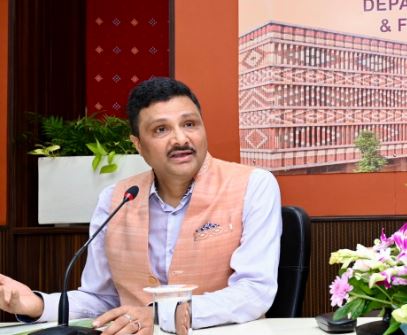Bhubaneswar: Odisha is emerging as a leader in sustainable agricultural practices with a focus on inclusivity, diversification, and climate resilience, according to Arabinda Kumar Padhee.
Padhee is the Principal Secretary of the Department of Agriculture and Farmers’ Empowerment of the Government of Odisha.
In an interview with PTI, Padhee shed light on the state’s comprehensive vision to transform agriculture into a sustainable and equitable growth driver.
“Agriculture contributes 22 per cent to Odisha’s Gross Value Added (GVA) and sustains 55-60 per cent of its population, particularly in rural and tribal areas. Yet, with 45-50 per cent of the farmland dependent on rainfall, the state is prioritising region-specific strategies to address these vulnerabilities,” he said.
Collaborative efforts with global research organisations, such as the International Food Policy Research Institute (IFPRI), are central to this transformation, he added.
On the crop pattern of the state, he said that while paddy remains dominant, the state is actively promoting high-value crops such as vegetables, pulses, oilseeds, and millets, and initiatives like Agri-Production Clusters are fostering diversification.
Additionally, rice-fallow management ensures improved soil fertility and increased farmer incomes by introducing pulses and oilseeds in fallow lands.
As Odisha encounters frequent natural calamities like floods and cyclones, Padhee said that the climate is indeed a significant challenge for us, as between 1972 and 2022, only three years have been free from extreme weather events, including floods, droughts, and cyclones.
“We are focusing on making our agricultural practices climate-resilient. Odisha has introduced submergence-tolerant rice varieties like Swana-Sub1, which can survive up to 12 days of flooding, drought-resistant crops, and salt-tolerant strains,” he told PTI.
A dedicated Climate Resilience Cell integrates sustainability into every new project, positioning the state as a pioneer in adaptive agriculture, he added.
When asked about the state’s smallholder farmers, the Principal Secretary said that with smallholders making up over 92 per cent of Odisha’s farmers, collective bargaining through Farmers’ Producer Organisations (FPOs) is enhancing market access.
“Digital tools provide crop-specific advice, while initiatives like Mukhyamantri Krushi Udyog Yojana foster rural entrepreneurship. Women farmers are at the forefront, benefitting from higher subsidies, skill development programs, and decision-making roles,” he told PTI.
Highlighting the state’s traditional crops, Padhee said that Odisha has gained national recognition for reviving traditional crops like millets, known for their resilience and nutritional value.
“We are trying to bring out our forgotten foods of the state. Forgotten foods are those that were hitherto used to be cultivated, but they have gone out of the fields of the farmers. So we are trying to bring such crops into the fold,” he said.
Odisha already has a Forgotten Food Policy, and we recently held an international symposium on forgotten foods that highlighted the importance of underutilised crops in addressing food security and environmental sustainability, he added.
“In conclusion, our vision is rooted in inclusivity, sustainability, and resilience,” said Padhee. “By leveraging technology, climate-smart practices, and evidence-based policies, we aim to enhance productivity while ensuring equitable growth for smallholders, women, and tribal communities.”
Padhee added that Odisha is setting an example for sustainable agricultural development across India with its focus on organic farming, agrobiodiversity, and climate-smart practices.
PTI
